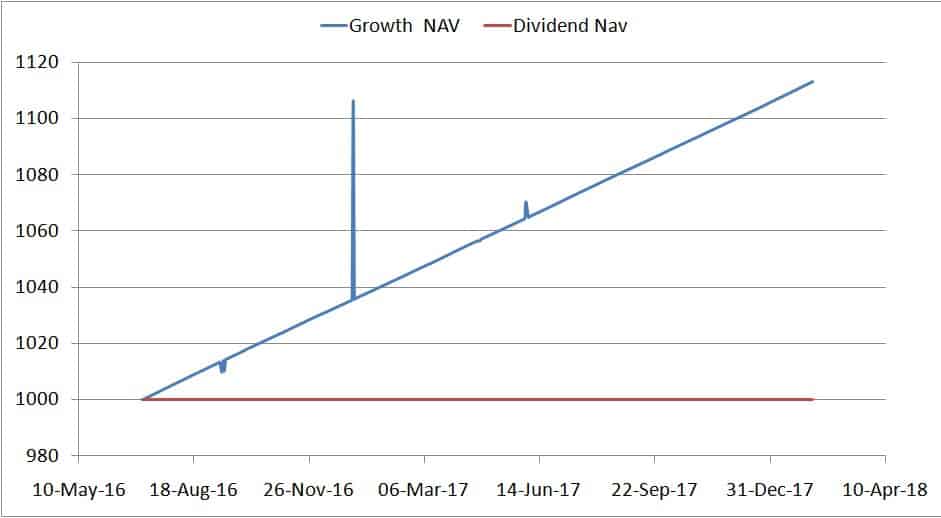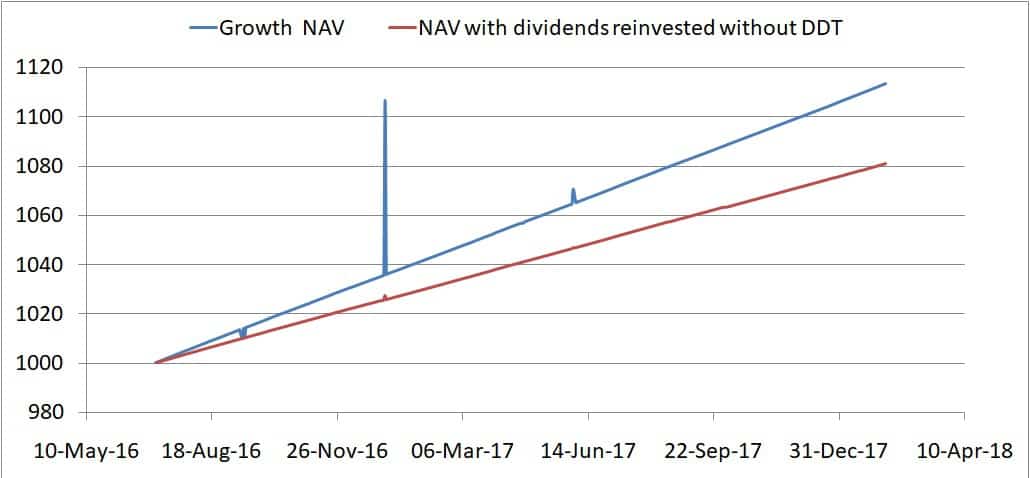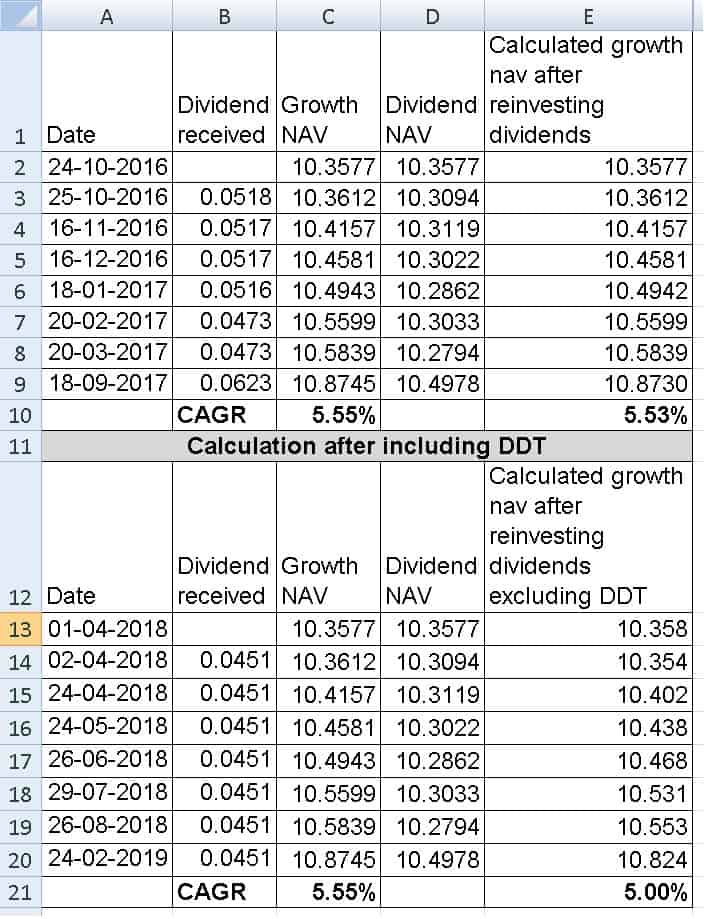Last Updated on December 28, 2021 at 6:30 pm
We are aware that debt mutual funds are subject to a dividend distribution tax (DDT). From April 1st 2018, equity mutual funds will also be subject to DDT. Here some examples as to how DDT affects mutual fund dividends and lowers returns. This post is in response to Ankit Jain’s comment in Equity Mutual Fund Dividends are taxed 12.942% (not 10%): Here is how to avoid this.
What is dividend distribution tax and how does it work?
In simple terms, DDT is a tax deducted at source by a mutual fund house before the distribution of the dividend. After this, no further tax need be paid by the investor. Once the dividend is declared and DDT deducted the NAV of the debt mutual fund will fall to a proportional extent.
First, let us consider examples with debt mutual funds.
Join 32,000+ readers and get free money management solutions delivered to your inbox! Subscribe to get posts via email! (Link takes you to our email sign-up form)
🔥Want to create a complete financial plan? Learn goal-based investing? Exclusive access to our DIY tools? Increase your income with your skills? Enjoy massive discounts on our robo-advisory tool & courses! 🔥
Up to March 31st 2018, debt fund dividends will be subject to 25% tax + 12% surcharge and 3% cess. After 1st April, the cess will be increased to 4%.
That is 25%*(1+12%)*(1+3%) = 28.84%. This is tax levied on the “grossed up dividend”
Suppose Rs. 10 is dividend received, the DDT is calculated as follows.
The grossed up dividend 10/(1-25%). And from this 28.84% tax is levied.
[10/(1-25%)]*28.84% =3.8453.
Thus the DDT amount divided by the divided received = 0.38453 or 38.453%.
In other words, 38.453% of the dividend received goes to the DDT. More examples can be found in the previous post. This gave many people (including myself) the wrong impression that for those in 30% tax slab, growth option is superior to dividend option – a fact that Ankit Jain pointed out is wrong.
Example 1: Daily dividend liquid fund.
This is an example of Mahindra Liquid fund Growth vs daily dividend (chose this because it the youngest and therefore only the latest DDT law would apply).
Please ignore the spikes in NAV. They are probably momentary market value fluctuations or just database errors. Notice that the daily dividend reduces the NAV to its base value. This means, I can put one crore (if I had it) in the daily dividend plan and the capital gain would be zero. The dividend would suffer a DDT, but I have to pay no further tax. At least for less than 3Y, this is better than growth for those in 30% slab (this is Ankit’s point).
On July 4th 2016, both the growth and daily dividend plan had a NAV of Rs. 1000.1594 per unit.
On the 5th July,
Growth NAV = 1000.3231
Daily Div NAV = 1000.1594
The difference: 0.1637. However, the dividend distributed was only 0.118191 per unit. The rest is the dividend distribution tax.
The DDT = 0.0455 per unit ~ 38.5% of the total dividend distributed.
The fund house will declare NAV for the dividend option after deducting the dividend and DDT.
Now, suppose we add back the dividend and DDT to the NAV, we get:
Note, this is not a simple addition and the NAV growth bet dividends will have to taken into account.
As expected, it would be pretty much identical to the growth NAV, aside from rounding off errors.
Since the DDT is removed, the impact of this can be seen by reinvesting the dividend received alone.
After 1Y from 4th of July 2017, the annualized return of the growth plan = 7.075%.
The annualized return of div plan with dividend reinvested = 5.088%. In other words, the return is reduced by 28.085% due to DDT. Hence suitable for those in 30% slab. The exact quantum of return reduction will depend on market movement, but will be lower than 31.2% (with 4% cess).
Example 2: Monthly dividend arbitrage fund with and without DDT
I have done the following calculation with Principal arbitrage fund. Top panel is without DDT (valid up to March 31st 2018) and bottom panel with DDT.
If a DDT = 12.942% of dividend received is deducted, the return is lower by about 9.85%.
I thank Ankit Jain and Krishnakumar Chandrasekaran for their inputs and Mahek Shah and Nimesh Samai (along with Ankit) for sharing their dividend fund transactions so that I could learn from it.
🔥Enjoy massive discounts on our courses, robo-advisory tool and exclusive investor circle! 🔥& join our community of 7000+ users!
Use our Robo-advisory Tool for a start-to-finish financial plan! ⇐ More than 2,500 investors and advisors use this!
Track your mutual funds and stock investments with this Google Sheet!
We also publish monthly equity mutual funds, debt and hybrid mutual funds, index funds and ETF screeners and momentum, low-volatility stock screeners.





- Do you have a comment about the above article? Reach out to us on Twitter: @freefincal or @pattufreefincal
- Have a question? Subscribe to our newsletter using the form below.
- Hit 'reply' to any email from us! We do not offer personalized investment advice. We can write a detailed article without mentioning your name if you have a generic question.
Join 32,000+ readers and get free money management solutions delivered to your inbox! Subscribe to get posts via email! (Link takes you to our email sign-up form)
About The Author
 Dr M. Pattabiraman(PhD) is the founder, managing editor and primary author of freefincal. He is an associate professor at the Indian Institute of Technology, Madras. He has over ten years of experience publishing news analysis, research and financial product development. Connect with him via Twitter(X), Linkedin, or YouTube. Pattabiraman has co-authored three print books: (1) You can be rich too with goal-based investing (CNBC TV18) for DIY investors. (2) Gamechanger for young earners. (3) Chinchu Gets a Superpower! for kids. He has also written seven other free e-books on various money management topics. He is a patron and co-founder of “Fee-only India,” an organisation promoting unbiased, commission-free investment advice.
Dr M. Pattabiraman(PhD) is the founder, managing editor and primary author of freefincal. He is an associate professor at the Indian Institute of Technology, Madras. He has over ten years of experience publishing news analysis, research and financial product development. Connect with him via Twitter(X), Linkedin, or YouTube. Pattabiraman has co-authored three print books: (1) You can be rich too with goal-based investing (CNBC TV18) for DIY investors. (2) Gamechanger for young earners. (3) Chinchu Gets a Superpower! for kids. He has also written seven other free e-books on various money management topics. He is a patron and co-founder of “Fee-only India,” an organisation promoting unbiased, commission-free investment advice.Our flagship course! Learn to manage your portfolio like a pro to achieve your goals regardless of market conditions! ⇐ More than 3,000 investors and advisors are part of our exclusive community! Get clarity on how to plan for your goals and achieve the necessary corpus no matter the market condition is!! Watch the first lecture for free! One-time payment! No recurring fees! Life-long access to videos! Reduce fear, uncertainty and doubt while investing! Learn how to plan for your goals before and after retirement with confidence.
Our new course! Increase your income by getting people to pay for your skills! ⇐ More than 700 salaried employees, entrepreneurs and financial advisors are part of our exclusive community! Learn how to get people to pay for your skills! Whether you are a professional or small business owner who wants more clients via online visibility or a salaried person wanting a side income or passive income, we will show you how to achieve this by showcasing your skills and building a community that trusts and pays you! (watch 1st lecture for free). One-time payment! No recurring fees! Life-long access to videos!
Our new book for kids: “Chinchu Gets a Superpower!” is now available!


Must-read book even for adults! This is something that every parent should teach their kids right from their young age. The importance of money management and decision making based on their wants and needs. Very nicely written in simple terms. - Arun.Buy the book: Chinchu gets a superpower for your child!
How to profit from content writing: Our new ebook is for those interested in getting side income via content writing. It is available at a 50% discount for Rs. 500 only!
Do you want to check if the market is overvalued or undervalued? Use our market valuation tool (it will work with any index!), or get the Tactical Buy/Sell timing tool!
We publish monthly mutual fund screeners and momentum, low-volatility stock screeners.
About freefincal & its content policy. Freefincal is a News Media Organization dedicated to providing original analysis, reports, reviews and insights on mutual funds, stocks, investing, retirement and personal finance developments. We do so without conflict of interest and bias. Follow us on Google News. Freefincal serves more than three million readers a year (5 million page views) with articles based only on factual information and detailed analysis by its authors. All statements made will be verified with credible and knowledgeable sources before publication. Freefincal does not publish paid articles, promotions, PR, satire or opinions without data. All opinions will be inferences backed by verifiable, reproducible evidence/data. Contact information: To get in touch, use this contact form. (Sponsored posts or paid collaborations will not be entertained.)
Connect with us on social media
- Twitter @freefincal
- Subscribe to our YouTube Videos
- Posts feed via Feedburner.
Our publications
You Can Be Rich Too with Goal-Based Investing
 Published by CNBC TV18, this book is meant to help you ask the right questions and seek the correct answers, and since it comes with nine online calculators, you can also create custom solutions for your lifestyle! Get it now.
Published by CNBC TV18, this book is meant to help you ask the right questions and seek the correct answers, and since it comes with nine online calculators, you can also create custom solutions for your lifestyle! Get it now.Gamechanger: Forget Startups, Join Corporate & Still Live the Rich Life You Want
 This book is meant for young earners to get their basics right from day one! It will also help you travel to exotic places at a low cost! Get it or gift it to a young earner.
This book is meant for young earners to get their basics right from day one! It will also help you travel to exotic places at a low cost! Get it or gift it to a young earner.Your Ultimate Guide to Travel
 This is an in-depth dive into vacation planning, finding cheap flights, budget accommodation, what to do when travelling, and how travelling slowly is better financially and psychologically, with links to the web pages and hand-holding at every step. Get the pdf for Rs 300 (instant download)
This is an in-depth dive into vacation planning, finding cheap flights, budget accommodation, what to do when travelling, and how travelling slowly is better financially and psychologically, with links to the web pages and hand-holding at every step. Get the pdf for Rs 300 (instant download)


